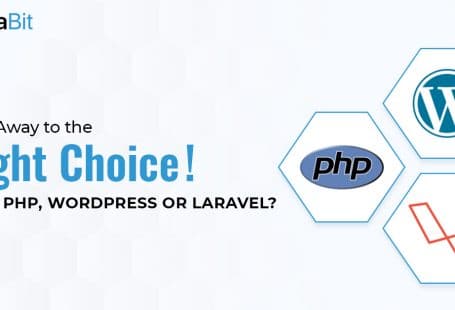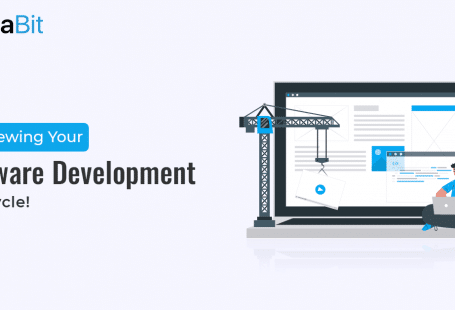As far as the price is concerned, software solutions have never been affordable. So, If it isn’t about the money, what else makes us choose a readymade solution over a tailor-made one?
Whether you start a new business or expand the existing one, building software is that one factor that impacts your entire development process. There are too many questions that revolve around software development. Let us try and answer the most crucial one.
“Why Should One Go Bespoke With Its Software?”
Did you know you can actually earn more profits by spending money on custom development?
If not then you will be surprised how much you save with custom development. All you need to do is keep reading ahead.
In our previous article, we discussed how every business needs a customized solution or bespoke software solution. If you want to get some insights on the process of custom software, you can check it out, here : bespoke software solution.
However, many enterprises, especially startups often end up in a dilemma for choosing the right development solution for their business. It is implied to find an ideal choice. Therefore, we decided to compare both commercial and custom solutions and let you decide which one works best for you.
Let us weigh it with the off-the-shelf one this time.
There are endless advantages of going bespoke along with the profits. How about we explore what lies ahead with choosing commercial or custom software?
Commercial vs Bespoke Development: Making the Right Choice
To make a fair decision, we first need to understand the difference between off-the-shelf (commercial) development and custom development.

Commercial or off-the-shelf software is a ready-to-use software that is pre-installed on a device or system. On the other hand, Bespoke software is built on the basis of specific requirements and specifications.
Few more criteria act as a massive gap between both the software technologies. We can also differentiate them based on their usages, functionalities and performance. Every factor provides its own merits and demerits. Let us take a look :
The Question of Cost

Commercial software is generally moderately priced when compared to personalized software and products. The primary and apparent reason is that the price involved in creating an off-the-shelf product is distributed among several vendors who decide the cost based on how the licenses are sold to them.
Whereas a customized product is specially created for the client and this is why the development cost is carried out by the customer alone. If you look at it this way, it may seem that a commercial software product is the right way to go.
Purchasing readymade software gives you an accurate estimate of the cost along with the support for whatever challenges you face while working in the project lifecycle. But If we talk about the performance, it may never run as good and apt as the custom made product.
Development Team Support
Many enterprises, when developing in-house, underestimate the time and resource needed to build a custom product. So If you are one of them, here is a hack.
For an easy outcome, your development team needs to take an initial account for designing, building, testing, implementation cost concerned with a lifetime maintenance cost required for headcount enhancements, general maintenance, patches and support. Also, do not forget to include the cost of upgrading your software.
Sometimes, the enterprise may have the budget to develop in-house software, but they may lack the skilled resources. For this, you can get access to an experienced team by outsourcing. The Outsourcing route kind of gives you the best of both worlds. You have the availability of readymade resources, just the way you want it, and you do not have to worry about the development process.
Implementation: which one is easier?
Coding is becoming a piece of cake day by day. Gone are those days when coders or programmers had to spend weeks contemplating lines of code even while sleeping. Today, coding is an essential subject to a high school student. Not only this, today, almost every software has a proliferation of open source, which means there are available code snippets for just about any functionality.
What’s more fascinating to the eyes is the drag and drop interface, making it easier to roll out complicated and highly advanced applications without writing a single line of code. There are specific platforms such as Zoho Creator, File Maker, QuickBase, SalesForce that simplify the job of making highly intuitive software and applications.
However, neglecting code does not mean the development process is easy. Coding is just one aspect; there are several other requirements like gathering, designing apps, testing UX and other critical functions that require skilled professionals.
One such aspect is implementation. Developing customized software is much more manageable on the ground of building everything from scratch. With readymade software, you might have to perform the gathering exercise, choose the right product, require infrastructure support with other considerable efforts.
The Need for Deep Customization

Developing in-house software can be a great idea if the software needs extensive customization. However, major tech giants such as Microsoft and Google now offer scalable and advanced solutions customized with the enterprise name. Similarly, product owners seeking a CRM suite can choose any relevant one from the market. Some of the popular CRM suites are Insightly, HubSpot CRM, Zoho CRM etc.
But the devil resides in the details. If your readymade software is not modular enough, it might result in clogging the systems with unnecessary options and bugs. To avoid such situations, building custom software can terminate additional options, assure bloat-free software and optimize the exact needs of your business.
Upgrades: What’s new?

Off-the-shelf software has regular updates which may or may not be according to your will. Sometimes, when the product is not upgraded for a long time, you might end up working on an outdated product that directly impacts your business.
With custom software, you are the king. You have the freedom to make whatever changes you want and whenever you want. You don’t have to wait for upgrades and releases to add new features to your software.
Nature of the Enterprise
The nature of your business has a big say in whether you should choose a bespoke product or a commercial product. Small agencies usually are short of budget, time and resources. But again, in order to expand their footprints in the market, they might need a more streamlined product for their business.
Another critical parameter is the end-user or the customer who is going to use your product. Users demand unique and friendly products that can remind them of the brand. This is only possible when you are building your software from scratch.
Now that we have an edge for Bespoke software solutions let us briefly glance at the advantages and disadvantages of bespoke software and products.
Advantages of Bespoke Software
- Your very own solution
Custom software is explicitly developed for your business needs and hence is a solution to all the business problems. You own the software which is unique to you. Therefore, it is undeniable that the value of a product justifies the best interest of your company.
- Flexible Updates and Support :
You can quickly expand or modify your personalized software to keep up with the business trends. The best part is, you get to choose these solutions at your own convenience. Even if you create bespoke web apps, you get the flexibility to make amendments whenever you need. You can define the features, level of support, and overall design to fit your needs.
- No Security Issues
Commercial software is always risky. Since you have to share the software with multiple users, your data is always on the verge of hacking. With bespoke solutions, security is rarely an issue.
- Competitive Edge :
Your market competitors will not be able to use the software since it only belongs to you. This offers you a competitive edge in the business, which is not easy to replicate.
Disadvantages of Bespoke Software
- Requires Time and Energy :
Customized solutions are not a quick fix. From understanding your requirements to making it to the development process to discovering bugs and issues before the actual launch can be a hectic task. It can be a challenge to develop personalized software if you are short of resources or time.
- Sometimes High upfront Cost :
Developing personalized solutions from scratch is not going to be very cost-effective. However, keep in mind that this upfront cost will result in a powerful and robust solution with better profits in the future.
Wrapping Up
Bespoke solutions are going to have your back for a long time in the market. You are going to stand out in terms of flexibility and growth. Technology has evolved and has become widely available, making our users more tech-savvy. In such times, Only innovative solutions like bespoke can save us. So what are we waiting for? There are several more advantages of bespoke software solutions that can help overcome every business challenge coming your way.




